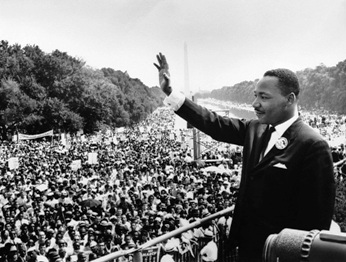Dr. Alvin F. Poussaint is the Director of the Media Center at the Judge Baker Children’s Center in Boston and one of the nation’s leading psychiatrists. He is also a Professor of Psychiatry at Harvard Medical School. A highly regarded specialist on race relations in America, Dr. Poussaint has served as a consultant to many corporations and government agencies. He has lectured and written on a wide range of social issues including the need for tolerance.

Dr. Poussaint’s story, regarding time spent with Dr. King, stresses a dedication to hard work, sound judgment, and perseverance to pull you through fearful times.
“The core principles in my life are to work hard to achieve my goals and always maintain a high level of commitment and integrity. Never quit. During difficult times, I always said to myself that if I’m going to fail, I’m going to go down fighting. One of my primary goals has been to fight for justice and an end to racial discrimination. I would not, however, let race become an obstacle to my success.
“During my work in the civil rights movement, there were many terrifying moments. There was only one, however, when my knees were literally shaking. On June 21, 1966, the second anniversary of the death of three civil rights workers – James Chaney, Andrew Goodman, and Michael Schwerner – Reverend Martin Luther King led a group of us from the Meredith March to the courthouse in Philadelphia, Mississippi. King wanted to pay tribute to these workers who had been killed in Philadelphia.
“Andy Young had asked me to walk next to King because I was the physician on the march and had the medical supplies to tend to King if anything happened. We were afraid something would happen because it was a very dangerous situation. The crowd of white townspeople was out of control, shouting and taunting at the marchers as we walked through the town.
“Sheriff Rainey and Deputy Sheriff Price, who had been implicated in the murder of the three workers, came out of the courthouse with their weapons and stopped King. Price or Rainey told King he could not proceed. As he stared at Rainey for a long moment, I thought King would keep going and we would all be injured or perhaps killed. Instead, King knelt down and said for everyone to kneel. He said a prayer to honor the three dead workers, then got up and turned around to leave. I was very relieved. Going back to the cars to return to the Meredith march was still frightening. A car driven by a group of white men almost hit Stokely Carmichael; he had to jump out of the way as the car drove straight into the marchers.
“In spite of my fear during this incident, I stayed with King and fulfilled what I felt was my duty and commitment to struggle for the rights of African Americans. I served as the Southern Field Director of the Medical Committee for Human Rights from 1965 to 1967 in Jackson, Mississippi. That choice set the course for my life since then.”
It’s important to remember that perhaps Dr. King’s greatest legacy is the many individuals he inspired to carry on The Dream.
Comments










